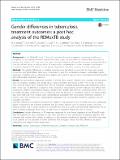Gender differences in tuberculosis treatment outcomes : a post hoc analysis of the REMoxTB study
Abstract
Background: In the REMoxTB study of 4-month treatment-shortening regimens containing moxifloxacin compared to the standard 6-month regimen for tuberculosis, the proportion of unfavourable outcomes for women was similar in all study arms, but men had more frequent unfavourable outcomes (bacteriologically or clinically defined failure or relapse within 18 months after randomisation) on the shortened moxifloxacin-containing regimens. The reason for this gender disparity in treatment outcome is poorly understood. Methods: The gender differences in baseline variables were calculated, as was time to smear and culture conversion and Kaplan-Meier plots were constructed. In post hoc exploratory analyses, multivariable logistic regression modelling and an observed case analysis were used to explore factors associated with both gender and unfavourable treatment outcome. Results: The per-protocol population included 472/1548 (30%) women. Women were younger and had lower rates of cavitation, smoking and weight (all p < 0.05) and higher prevalence of HIV (10% vs 6%, p = 0.001). They received higher doses (mg/kg) than men of rifampicin, isoniazid, pyrazinamide and moxifloxacin (p ≤ 0.005). There was no difference in baseline smear grading or mycobacterial growth indicator tube (MGIT) time to positivity. Women converted to negative cultures more quickly than men on Lowenstein-Jensen (HR 1.14, p = 0.008) and MGIT media (HR 1.19, p < 0.001). In men, the presence of cavitation, positive HIV status, higher age, lower BMI and ‘ever smoked’ were independently associated with unfavourable treatment outcome. In women, only ‘ever smoked’ was independently associated with unfavourable treatment outcome. Only for cavitation was there a gender difference in treatment outcomes by regimen; their outcome in the 4-month arms was significantly poorer compared to the 6-month treatment arm (p < 0.001). Women, with or without cavities, and men without cavities had a similar outcome on all treatment arms (p = 0.218, 0.224 and 0.689 respectively). For all other covariate subgroups, there were no differences in treatment effects for men or women. Conclusions: Gender differences in TB treatment responses for the shorter regimens in the REMoxTB study may be explained by poor outcomes in men with cavitation on the moxifloxacin-containing regimens. We observed that women with cavities, or without, on the 4-month moxifloxacin regimens had similar outcomes to all patients on the standard 6-month treatment. The biological reasons for this difference are poorly understood and require further exploration.
Citation
Murphy , M E , Wills , G H , Murthy , S , Louw , C , Bateson , A L C , Hunt , R D , McHugh , T D , Nunn , A J , Meredith , S K , Mendel , C M , Spigelman , M , Crook , A M , Gillespie , S H & REMoxTB Consortium 2018 , ' Gender differences in tuberculosis treatment outcomes : a post hoc analysis of the REMoxTB study ' , BMC Medicine , vol. 16 , 189 . https://doi.org/10.1186/s12916-018-1169-5
Publication
BMC Medicine
Status
Peer reviewed
ISSN
1741-7015Type
Journal article
Description
This study was supported by the Global Alliance for TB Drug Development with support from the Bill and Melinda Gates Foundation, the European and Developing Countries Clinical Trials Partnership (grant IP.2007.32011.011), US Agency for International Development, UK Department for International Development, Directorate General for International Cooperation of the Netherlands, Irish Aid, Australia Department of Foreign Affairs and Trade and National Institutes of Health, AIDS Clinical Trials Group and by grants from the National Institute of Allergy and Infectious Diseases (NIAID) (UM1AI068634, UM1 AI068636 and UM1AI106701) and by NIAID grants to the University of KwaZulu Natal, South Africa, AIDS Clinical Trials Group (ACTG) site 31422 (1U01AI069469); to the Perinatal HIV Research Unit, Chris Hani Baragwanath Hospital, South Africa, ACTG site 12301 (1U01AI069453); and to the Durban International Clinical Trials Unit, South Africa, ACTG site 11201 (1U01AI069426); Bayer Healthcare for the donation of moxifloxacin and Sanofi for the donation of rifampin.Collections
Items in the St Andrews Research Repository are protected by copyright, with all rights reserved, unless otherwise indicated.

